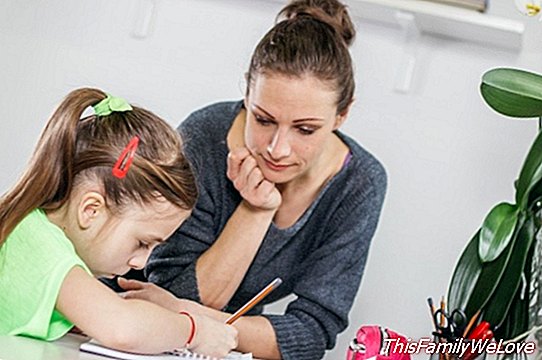Homework, how do they affect family life?

For a long time, the arguments for or against doing tasks or homework at home, generates tensions and conflicts between families, in educational centers and in associations of fathers and mothers. Determining how many there are many or few duties, what is the usefulness of school tasks for learning and the benefit in children's lives is still part of the problem.
They contribute to this debate periodically intensifying, cases like the one of a mother of three children, Eva Bailén, who through the Change.org platform began in the 2014/2015 course the campaign "For the rationalization of the duties in the system educational ", collecting 215,000 signatures of the 150,000 required to submit to the Ministry of Education. He launched the campaign before the impotence of seeing how his 10-year-old son spent 2 to 3 hours, to do homework at home and instead his other two children the teachers put them less, although it should be noted that the three drew good notes.
Family and school duties
According to the Organization for Economic Cooperation and Development (OECD), Spanish students make an average of 6.5 hours of weekly tasks compared to 4.9 hours that they spend on average in other countries. Spain is the 5th country that puts more duties, although this data does not result in higher academic performance. Two countries listed at the top of the PISA report, South Korea and Finland, consider it sufficient to dedicate 3 hours per week.
A study conducted by the Spanish Confederation of Associations of Parents of Students (Ceapa), after consulting 1,748 parents and 472 children, most of whom studied in public schools, noted that 40% of families believe that their children they have too many duties and 48% think that these tasks negatively affect family life.
The burden of homework can cause family tensions, due to long working hours of parents that prevent family reconciliation and sharing free time with their children. The fact that children spend 2 to 3 hours a day doing homework, which takes time to play, that some children need help to do so and require the presence of parents or a private teacher, which is sometimes not possible, the pressure exerted by the school and teachers when they are not done due to lack of time or motivation ... are some of the most recurrent topics in the discussion forums that generate tension in families.
Arguments for the discussion of homework
- Lack of coordination among teachers. The school tasks should be agreed among the teachers of the different subjects, so that not all send homework the same day. For example: on Monday do the mathematics, on Tuesday the science, etc.
- The time to do homework should be adapted to the age of each student. In Primary it is enough to dedicate them between 30-60 minutes. The time of study in the Secondary should be increasing, starting from a minimum of approximately one hour.
We must also appreciate that there are other ways of learning for a child, such as playing, experimenting with creativity, etc.
- Students should consider the school tasks useful for their training. Duties have to be connected to the social and school environment in which they are currently moving.
- They can not be the repetition of the work done in class, since apart from not providing them with new knowledge they can cause demotivation and boredom.
- The need for reinforcement classes it can be an argument against excess of duties: They can generate and increase social inequalities for students with family socio-economic and cultural disadvantages. In the case that they need help or reinforcement classes, there is the circumstance that they can not have the help of their parents or other people because it is an economic expense difficult to assume by their families.
Mercedes Corbella. Psychologist and diploma in Social Work.




